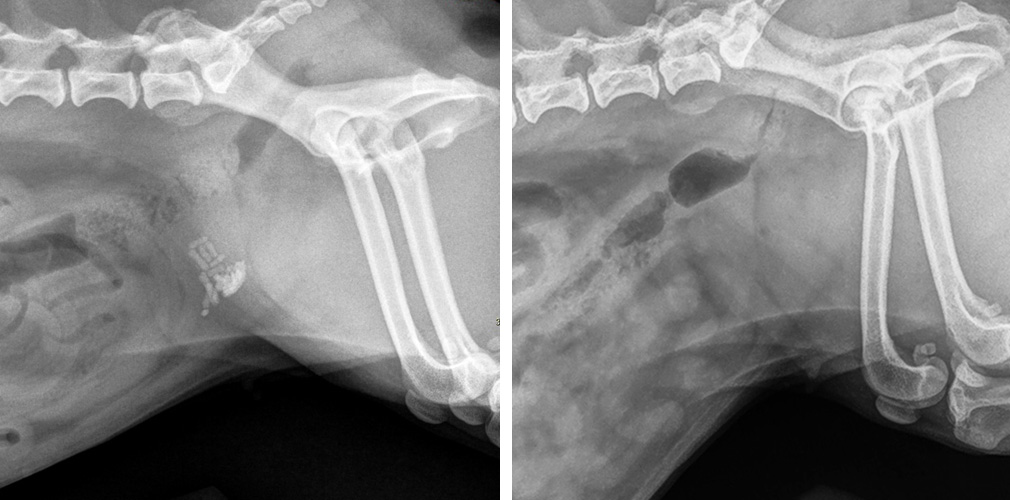No shortcuts through grieving process
[row][column size=”6″]Our pets become part of our family. They develop distinct relationships with each family member, human and animal alike. After a pet’s death, each family member will go through the grieving process in his or her own way.
Gail Wallis Hague, a counseling psychologist with close to 40 years of experience, says that feelings of sadness, anger, loss, shock, or guilt often arise when a pet dies. Processing these feelings can be overwhelming and seem never-ending, according to Hague, who works as the grief counselor at the University of Illinois Veterinary Teaching Hospital in Urbana. She also manages the college’s CARE Pet Loss Grief Helpline.
[/column][column size=”6″]
[callout title=”Update on the Care Pet Loss Helpline”]
The University of Illinois College of Veterinary Medicine no longer offers a grief telephone support service.
For an overview of grief from the loss of a pet and ways to cope with it, please read Take Time to Grieve Your Pet.
Information from the American Veterinary Medical Association on Coping with the Loss of a Pet.
[/callout][/column][/row]
Everyone Grieves Differently
Grieving the loss of a pet is a journey that differs for every person and even other animals in the home.
“There are as many grief reactions as there are people who are grieving,” Hague explains. Each person who is grieving is unique, as is the relationship that person had with the pet. The circumstances of the pet’s death and family also play a role in how people mourn the loss.
The grieving process requires time, and there are no shortcuts to get through it.
“Grief will come in waves,” says Hague. “As times goes by, the quality of the grief changes and eventually the waves get further and further apart.”
Helping Children with Grief
“It is important to recognize the various signs of grief and to be supportive of those who are going through the process,” she says. A strong support system filled with people who are sympathetic and encouraging to the mourning process makes the journey more bearable.
Children under the age of 7 don’t fully understand the permanence of death. They will need information tailored to their developmental stage. Parents may find it hard to explain the pet’s death to their children, especially while the parents themselves are grieving.
“There are many wonderful children’s books that help explain the loss of a pet in way that is easier to understand,” Hague says. There are also books for parents to help them guide their children through the difficult process.
Pets Grieve Too
All pets, no matter the species, have the capacity to grieve the loss of a fellow pet in the household.
“A pet going through loss may show signs such as acting bewildered, looking for the other animal to come home, losing interest in normal activities, sleeping a lot, or becoming more needy,” Hague says.
Animals may also act out, becoming snippy or just wanting to be alone. It is vital to allow the animal time to work through this, and with time the grieving behaviors should pass. However, an animal that is not eating or drinking, is losing weight, or otherwise appears ill should be seen by a veterinarian right away.
“I have often seen how a pet will step into the role of the animal who passed away,” Hague observes.
Adding Another Pet
For some people, it will take time to be ready to welcome another pet; for others, it won’t take long at all. There is no right amount of time.
“One pet cannot replace another. People often feel that they need to wait to get another pet out of respect for the pet that they lost,” Hague says. “However, the finest thing a person can do for a pet they lost is to love another animal.”
The bond with a new pet will not be identical to the bond that was broken by the pet’s death.
“When the longing to share a bond with a pet outweighs the grief, then the person is ready to welcome another animal,” Hague advises.
Seeking Help
Many resources are available to help people who are mourning the loss of a pet. At the University of Illinois Veterinary Teaching Hospital, there is free one-on-one grief counseling available.
Hague advises those going through the grieving process to engage in activities that bring them joy and peace with whatever energy is present. She also emphasizes the need to talk about feelings.
“If someone just swallows his feelings without expressing them, these suppressed feelings will manifest later in unhealthy ways,” Hague says. Symptoms of physical or emotional illness may arise. If symptoms of illness occur, seek a physician, counselor, or therapist.
“People must know that it is normal and natural to love a pet as deeply as we love the people in our lives. There is no reaction to be ashamed of while mourning the loss of a pet,” Hague reiterates.
By Beth Mueller




